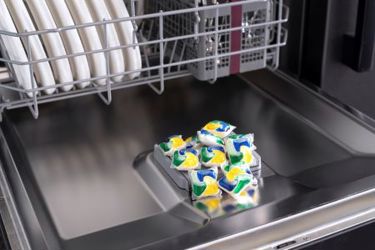Dishwasher Pods And Laundry Sheets Face Ban In NYC Over Microplastic Contamination


Some popular consumer cleaning products are on the chopping block in New York City as officials look to protect drinking water from an emerging contaminant.
“City Council Member James Gennaro, a Democrat, introduced a bill … that would make it illegal to sell or distribute detergent pods or laundry sheets that contain polyvinyl alcohol, also known as PVA or PVOH,” Bloomberg reported. “While detergent pods and sheets ‘dissolve’ in the wash, PVA is ultimately a type of plastic. The bill notes that microplastics … and nanoplastics … are ubiquitous sources of pollution in U.S. waterways.”
Microplastics are an emerging contamination concern for water systems across the world but the prospect of removing them from wastewater or drinking water effluent is daunting and will require more innovation to become feasible. Despite that, California has been working to introduce stricter standards on this type of contamination.
New York City’s latest efforts could introduce a new model for curbing the contamination, which would block microplastics from ever entering the environment to begin with. But PVA manufacturers have pushed back on the idea that they are a source of the problem.
“In a statement, P&G (Procter & Gamble Co.) said PVA ‘does not contribute to microplastic pollution,’ citing ‘extensive recent reviews by regulatory agencies around the world, including the EPA and (U.S. Food and Drug Administration),” according to Bloomberg. “Laundry pods ‘have been a very important stride forward on the journey of sustainability in the laundry world,’ said Alastair Dorward, chief executive officer of Dropps, which describes its pods as biodegradable.”
Researchers have pointed out that PVA does not degrade quickly in the environment and, like many other plastics that enter source water through a broad range of products, it can pose a threat to wildlife and possibly consumers after reaching source water.
By taking new action to potentially eliminate some microplastics at their source, New York City might establish a template for other water systems to follow.
“The proposed ban on laundry and dishwasher pods in New York City is perhaps most similar to the Microbead-Free Waters Act of 2015, a federal law that banned cosmetics that featured plastic microbeads,” per Fast Company. “New York City, meanwhile, often acts as a leader for enacting environmental regulations.”
It seems that there is a long way to go in the fight against microplastic contamination, on both the regulatory and technological fronts. But as more products introduce these microscopic pollutants into drinking water and the impact on consumers becomes clearer, it seems to be a fight some advocates want to take on.
To read more about the regulations that govern drinking water treatment operations, visit Water Online’s Regulations And Legislation Solutions Center.
